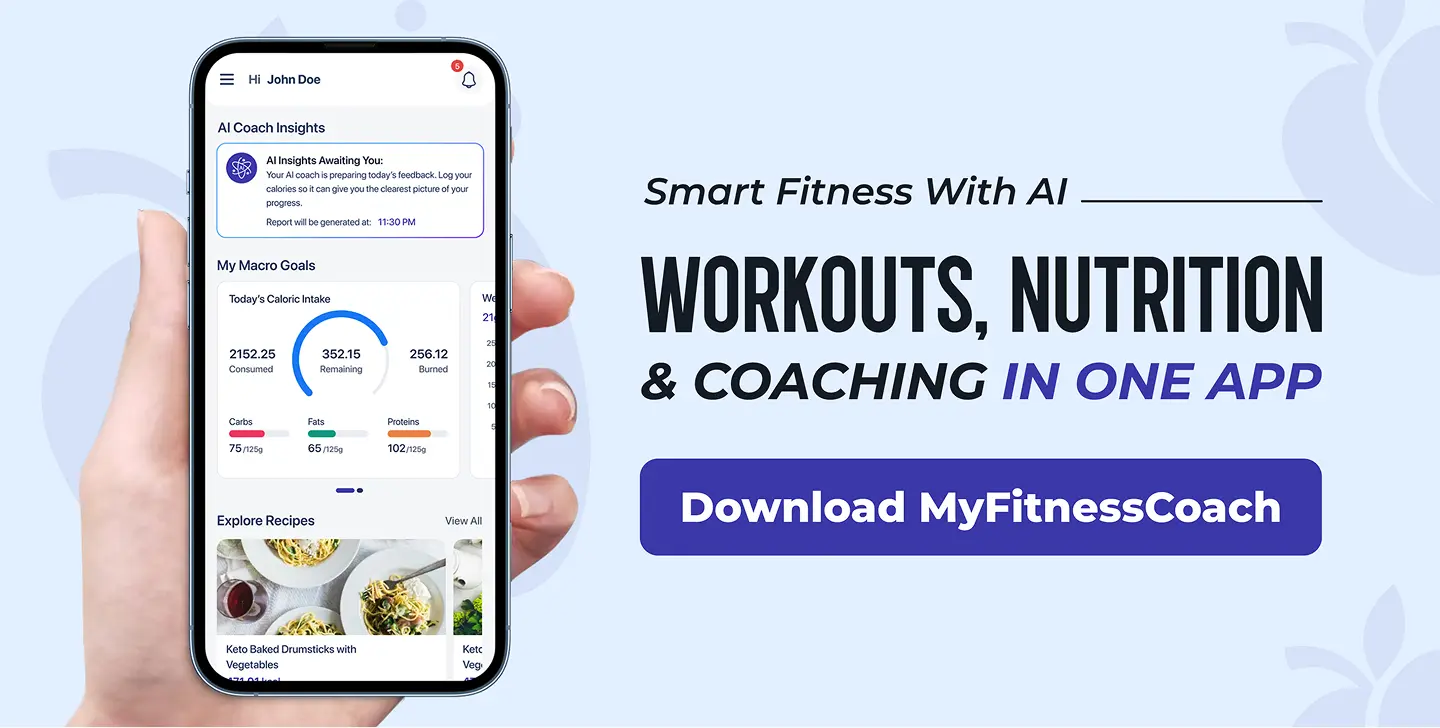The Science Behind Muscle Recovery: Ways to Bounce Back

MyFitnessCoach
November 14, 2023
The process of muscle recovery holds extreme importance in your fitness journey. Muscle recovery practice silently does its crucial work to help you perform at your best and stay injury-free. It doesn't matter if you're a pro athlete or just starting into the world of fitness – knowing the basics of muscle recovery is super important. So, in this guide, we will take a closer look at the fundamental ideas about muscle recovery. We want to ensure you understand this essential part of your fitness journey without confusion. Let's dive in and explore the ins and outs of muscle recovery in a way that's easy to understand and apply to your workouts.
The Cause of Muscle Soreness After Exercise
When your muscles are sore after a workout, it's called delayed onset muscle soreness (DOMS). Research tells us that this bitter feeling is your body reacting to tiny injuries during intense exercises. It happens because of microscopic tears in your muscle fibers, leading to inflammation. Even though it might not feel great, this soreness is normal and essential to building stronger muscles.
The Importance of Muscle Recovery
Muscle Recover is importance because:
Preventing Injury:
Sufficient muscle recovery is essential in minimizing the chances of getting hurt. If you train too much without allowing your muscles enough time to recover, you might end up feeling overly tired, experiencing muscle strains, and facing the risk of other injuries. These injuries could slow down or delay your overall fitness progress.
Optimizing Performance:
Making sure that your muscles are all set for your next workout through proper muscle recovery is like giving them a good rest so they can perform even better. It's like a recharge for your muscles, strengthening them, helping you endure more, and becoming more active as time passes. So, taking the time for muscle recovery isn't just a break; it's a way to make your muscles even more vital for the future.
Muscle Growth:
For individuals to build muscles, taking time for recovery is very important. After you finish exercising, the muscle recovery phase actively contributes to the development of your muscles. This becomes a fundamental component of any plan designed to build muscle. In simpler terms, giving your muscles the chance to repair themselves after a workout is a vital aspect of any fitness routine to make your muscles more potent and extensive.
Factors Affecting Muscle Recovery
Following are the key factors that affect muscle recovery:
Nutrition:
Maintaining a well-balanced diet is essential for helping your muscles recover after exercise. Eating enough protein is crucial because it gives your muscles the critical building blocks called amino acids, which they need to fix and grow. Also, keeping yourself hydrated and eating a diet full of vitamins and minerals is helpful for your muscle recovery. So, remember to fuel your body with the right stuff to keep those muscles well-built.
Sleep:
Getting good sleep is crucial for your muscles to recover properly. When you're in deep sleep, your body releases a growth hormone that helps fix tissues, including your muscles. Getting between 7 to 9 hours of sound sleep every night is essential to ensure your muscle recovery is working at its best.
Hydration:
Staying hydrated is super important because insufficient water can slow down how quickly your body gets better after a workout. Water helps carry nutrients to where they need to go, keeps your body temperature in check, and ensures your joints move smoothly. It's a good idea to drink enough water, especially before and after you exercise, to ensure your body can do its best to get more robust and recover.
Rest and Active Recovery:
Giving your muscles enough time to rest is super important. Rest days are necessary, but doing light activities on those days, which we call active recovery, can help. It gets your blood flowing and makes your muscles less stiff, making you feel better overall and helping to speed up muscle recovery.
Effective Strategies for Muscle Recovery
The most effective strategies for muscle recovery are:
Post-Workout Nutrition:
Consume a balanced meal or snack containing protein and carbohydrates within 30 minutes after exercising. This helps in refilling glycogen stores and starting the muscle recovery process.
Stretching and Flexibility Exercises:
Incorporating stretching into your routine improves flexibility and helps relax tense muscles. Dynamic stretching before a workout and static stretching afterward can contribute to better muscle recovery.
Foam Rolling:
Using a foam roller on sore muscles, also known as self-myofascial release, can ease muscle soreness and improve flexibility. It's a cost-effective and accessible method for self-massage and muscle recovery.
Ice Baths and Contrast Therapy:
While not everyone's favorite, cold therapy, such as ice baths or contrast showers (alternating between hot and cold water), can help reduce inflammation and promote blood circulation. This proves to be highly effective in muscle recovery.
Compression Garments:
Compression sleeves or garments can improve blood circulation, reducing muscle soreness and accelerating removing metabolic waste products from the muscles.
Common Misconceptions About Muscle Recovery
You must avoid the common mistake:
More Is Not Always Better:
Engaging in physical activity is vital for staying healthy, but doing more and more workouts only sometimes means you'll get better results. Taking breaks, or what we call rest days, is super important. These breaks give your muscles the chance to rest and become stronger. So, it's about more than just doing lots of exercise. It's also about giving your body the time to relax and become even more powerful.
Ignoring Pain:
Discomfort is like your body's messenger, letting you know something might be wrong. If you dismiss ongoing discomfort, it could result in long-term injuries. It's essential to tell the difference between the usual soreness you feel after exercising and pain that could be a sign of a more serious issue.
Relying Solely on Supplements:
While it's true that supplements can be a helpful addition to a balanced diet, it's important to remember that they shouldn't take the place of whole foods. Whole foods, like fruits, vegetables, grains, and proteins, offer a wide range of essential nutrients that support your overall health and aid in muscle recovery. So, while supplements provide some benefits, relying on them alone may not offer the same comprehensive nutritional support that whole foods can provide for your fitness and muscle recovery after exercise.
Getting fit is a big deal, and caring for your muscles is super important. Knowing the basics and using clever recovery methods is vital to ensure you're on the right track. Focus on helping your muscles recover by eating well, getting enough sleep, staying hydrated, and using specific recovery tricks. Remember, it's not only about how hard you work out; it's about giving your body the time and things it needs to return even more vital.

Ready to take your fitness journey to the next level? Discover the power of effective muscle recovery with MyFitnessCoach. Prioritize your body's well-being through proper nutrition, sleep, and targeted recovery techniques. Elevate your performance and embrace a more substantial, fitter you. Start your journey by downloading the MyFitnessCoach app today – because it's not just about working out hard; it's about recovering smarter.
Frequently Asked Questions
Similar Articles
Stay informed with these similar articles.

MyFitnessCoach
October 18, 2023
What Does Body Goals Mean? A Path to a Healthy Lifestyle
In the world we live in now, lots of people talk about "body goals," which means having a body that's seen as perfect. On social media, in magazines, and on TV, we see lots of pictures of people with what seems like perfect bodies, which makes us feel like we have to look like them. But the real meaning of "body goals" is more than just looking good. It's about taking care of your whole self, not just how you look. In this article, we will discuss what does body goals actually mean and how you can achieve your body goals. Let’s get started:
.webp&w=3840&q=75)
MyFitnessCoach
September 5, 2023
How Much Protein in an Egg | The Nutritional Power
Eggs have long been a breakfast favorite for many, and for good reason. They're not only delicious but also packed with essential nutrients, making them a versatile and nutritious addition to your diet. One of the most common questions about eggs is, "How much protein is in an egg?" In this comprehensive guide, we'll delve into the world of eggs and explore their protein content, nutritional benefits, and how they can contribute to a balanced diet.

MyFitnessCoach
May 18, 2023
Fitness Guide: How Do I Start A Weight Loss Journey
Ready to start on a life-changing weight-loss journey? Congratulations for taking the first step towards being a better and happier version of yourself! Starting off a weight-loss journey may be both satisfying and stressful. With so much information available, having a well-defined plan and trusted assistance in achieving your goals is important. This article will help you start your weight-loss journey and achieve the results you desire.
